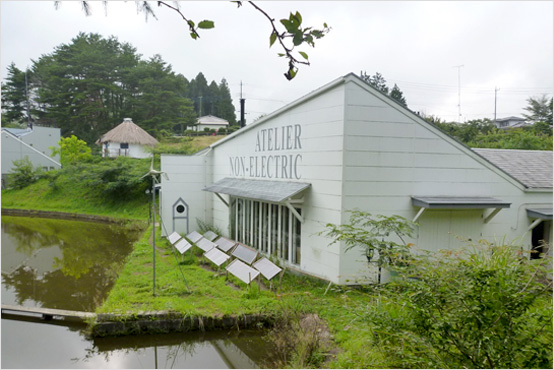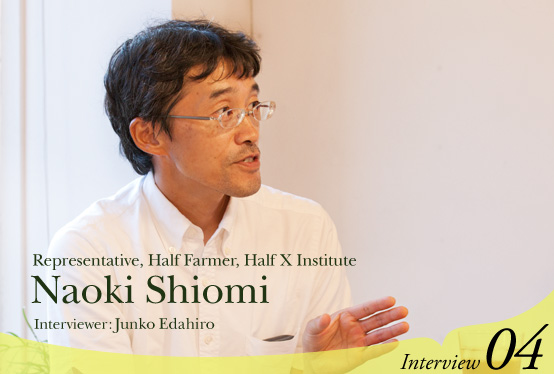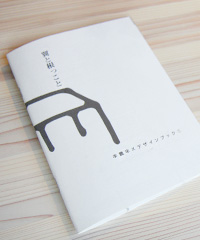- Edahiro:
- You mentioned earlier that our society is increasingly recognizing and wanting the Half Farmer, Half X lifestyle, as our times are increasingly becoming more difficult. What do you think is getting worse? Do more people accept or desire becoming a Half Farmer, Half X now?
- Shiomi:
- Our generation started thinking about peak oil 20 years ago and it is now becoming a reality.
- On top of the natural resources and food problems we face, I think climate change is another big factor. People used to say that last year's weather was strange, but now strange weather has become the norm. This has become more noticeable these past few years.
- Edahiro:
- Do you think that the general public is feeling a sense of danger observing these events and changes, and feeling that it may not always be the case that food can be bought with money?
- Shiomi:
- Yes, I think so. There was the Lehman Brothers' crisis, and I think many more are thinking and realizing things about their own work and money.
- In the book Han-nou Han X No Tane o Maku ("Planting the Seeds of Half Farmer, Half X"), which I put out about five years ago, I wrote about taking some kind of an action within five years, feeling like we needed to hurry.
- The reason being that the number of farmers in their seventies and eighties is increasing year by year, and so we have taken up the baton from them, and learn and continue the techniques and wisdom cultivated by these experts. It takes time to pass the baton and requires early action, but it is important not to be hasty and to take sure steps to continue the farming culture.
- I think we are at a turning point, especially with the recent earthquake in Japan on March 11, 2011. It's time to change many things like our energy sources, the way communities are, and how farming should work. In the future we need to be more energy self-sufficient, and perhaps we'll see people taking the Half Farmer, Half X route and become a "Half Farmer, Half X plus electricity," by selling electricity. We really are approaching the time of our last chance, and nothing is more important than all of this.
- From now on, we have to hurry but make steady changes, like the Japanese saying "Hurry with grace" tells us.
- Edahiro:
- When you hear just the words, Half Farmer, Half X, it might seems like it's only about your true calling, between you and the earth, but as you write in your books, the connection between people and communities that are formed through these missions are very important factors too.
- Shiomi:
- I think whether or not you love the place you live will be more important from now on. I felt that there is a special love the Tohoku people feel for their land throughout the earthquake and tsunami disaster last year. Even if people who don't like the place they live right now will learn to love it. In order to do so, you have to get your senses back in tune, and recognize the good things about your neighbourhood. The ideal situation is to live in a town you really love and do the work you really love.
- I think that every single person has their own X. I don't much like going on crowded trains in Tokyo, but thinking that all of those people on the train have their own X makes me happy.
- So where you live is very important. If you look for and find good places within a few kilometers of your place that you can walk to or bike to, it will be easy to love where you live and this makes it more enjoyable. Your senses will be heightened day by day and you will find more and more things that will enchant you.
- Edahiro:
- It's like searching for something, isn't it?
- Shiomi:
- I think it's also very important finding another person's X or being supportive. Like Rachel Carson says, "A child needs a person to support their sense of wonder." I think that people should be a support team for other people's X.
-
In my workshop, I do a little activity where I have everyone write out three things that describe their special abilities, important themes or life work, and they present those three key words to everyone. We don't often get a chance to talk or be heard nowadays, so to share your thoughts like this is very important.
The three key words they present are very diverse and don't overlap with each other. I often feel like each person's X is truly unique, the only one in the world. Say, for example, you like taking photos. There will always be a better photographer than you, but if you add the second and third key words into the mix you start to see that you are one-of-a-kind. Plus, we write out the geographical "stage" (name of city, village, town, or region) of where the activity will take place, so you really feel that you are a truly unique being.
I call this "shimei tayousei" (diversity of mission), by blending "life diversity" and "biodiversity" together.
- Edahiro:
- Even if you can grow your own food by being a half-farmer, you still need cash income so you try to obtain that through your X. You may find something you are good at, but it may be hard to connect that to a job you can make money with. This is the difficult part, isn't it?
- Shiomi:
- When I go to talk in front of a crowd, I sometimes get questions like, "Isn't Half Farmer, Half X only possible for elites?" and comments like "Those who know exactly what their X is, or a professional of the X can do it, but what about everyone else?" It is true that making a living on your X may not be easy, but you could start through volunteering.
- It would be ideal to work full-time, but doing a little community work or anything that makes you shine will enrich your life.
- Edahiro:
- I had the opportunity to go visit the inventor Fujimura's Atelier Non-Electric (pursuing a pleasant and convenient life without electricity). He wrote a book titled 30,000 Yen-a-Month Business, where he says that if you could run ten businesses that together make 30,000 yen per month, it would be more than enough to live on.
- He says that working full-time was considered ideal until now, but that may very well not be the case anymore. Rather, it is better to have ten things that make 30,000 yen (about U.S.$300) a month. It may be very difficult to produce 300,000 yen (about $3,000) with one job, but it might not be so hard if it made 30,000 yen per business. If you could make 3,000,000 yen (about $30,000) like that, if would be sufficient, and if you made your own food, even better.









